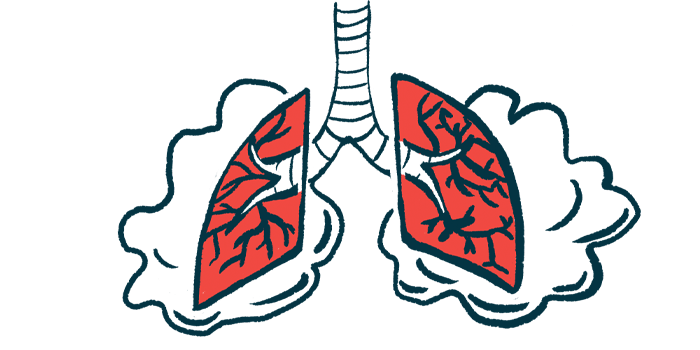Trikafta After CF Lung Transplant: Not Well-tolerated, Modest Benefits
Written by |

One year of Trikafta treatment for adults with cystic fibrosis (CF) post-lung transplant resulted in only limited improvements in sinus and digestive problems and was not well-tolerated, a small study found.
In fact, among the 13 patients in the study, the discontinuation rate for the triple-combination therapy was 38.4%.
“In our limited single-center experience, [Trikafta in lung transplant recipients] is poorly tolerated, with potential for negative pulmonary and mental health effects, modest perceived extrapulmonary benefit, and a significant effect on [transplant anti-rejection medication] dose requirements,” the researchers wrote.
Moreover, the study “identified mood disturbances as one of the most common adverse events associated with [Trikafta] therapy.”
However, given the study’s small size, more data are needed to recommend Trikafta use, dosing, and monitoring in this patient population, the team noted.
The study, “Poor tolerability of cystic fibrosis transmembrane conductance regulator modulator therapy in lung transplant recipients,” was published in the journal Pharmacotherapy.
Inherited defects in CFTR, a protein that helps maintain the balance of water and salt on many body surfaces, are the cause of cystic fibrosis. These defects lead to the buildup of thick mucus in various organs, including the lungs, intestines, pancreas, and liver. In CF cases where lung function is severely impaired, patients may need a lung transplant.
CFTR modulators are a class of approved medications designed to improve the function of defective CFTR protein. Trikafta is a CFTR modulator containing three different CFTR-affecting medicines: elexacaftor, tezacaftor, and ivacaftor. The therapy is available in the U.S. for patients ages 6 and older with at least one F508del CFTR mutation, the most common CF-causing genetic defect.
Clinical studies have demonstrated that Trikafta significantly improves lung function in CF patients and is well-tolerated with minimal adverse effects. The treatment also leads to other benefits, including weight gain, reduced sinus disease, and improved pancreas function.
Researchers and clinicians have theorized that cystic fibrosis patients who have undergone a lung transplant may benefit from Trikafta in ways beyond lung function, given that the disease is still present in various organs. However, little is known about the therapy’s efficacy and safety in this patient population. That’s in part because transplant patients were excluded from Trikafta’s approval studies due to narrow eligibility criteria.
Accordingly, investigators at the University of North Carolina reviewed data from 13 CF lung transplant recipients treated with Trikafta at their center. Outcomes included therapeutic benefit, tolerability, and interactions with other medications. Patients were assessed when Trikafta was started, and again after one year, or at discontinuation if the therapy was stopped.
The patients — nine men and four women — had started on Trikafta at a mean of 115 months, or 9.6 years, after surgery. Their mean age at transplant was 27 years, and all received immunosuppressive therapies to prevent organ rejection. It was the first transplant for each.
All had been given antimicrobial agents for sinus disease. Nine required insulin for CF-related diabetes and six were treated for depression or anxiety.
Sinus disease was the reason to start Trikafta for seven individuals, while sinus and digestive tract problems prompted six to begin treatment.
However, nearly 40% of the patients — five in total — permanently discontinued treatment before one year. Two stopped taking Trikafta due to lung function decline, two for self-reported mood disturbances, and one for lack of perceived benefit. The patients discontinued the therapy at a median of 6.4 months (195 days) following treatment initiation.
The discontinuation rate results “closely align with those seen in CF liver transplant recipients,” the team wrote.
For the two with lung function decline, no other cause was found. One of these patients started Trikafta four months after the transplant and stopped due to a sudden drop in immune neutrophil cells and lung function.
While on Trikafta, CF scans suggested thickening of the airways because of fluid or mucus buildup, and the patient coughed out a green fluid. After stopping the therapy, neutrophil counts and lung function normalized. Because of persistent sinus disease, Trikafta was restarted, but after two months, it was discontinued again due to a repeat reduction in lung function.
Similarly, both transplant recipients who stopped Trikafta for mood disturbances had established diagnoses of anxiety and depression that worsened after starting the therapy — then discontinued per patient request.
The researchers noted that such mood disturbances were one of the most common adverse events, or side effects, associated with the therapy.
“Although no mood disturbances were reported in the randomized control trials, subsequent case series have documented development of mental status changes shortly after [Trikafta] initiation,” they wrote.
Treatment was paused in three patients — in one for abdominal pain, one for a rash with itching, and one for mood changes — but restarted without further complaint.
Among the eight that remained on Trikafta, four reported adverse effects, including temporary loss of taste or smell, abdominal pain, sinus pressure or drainage, and vision changes.
Reductions in sinus symptoms were reported in six participants, while four had eased digestive symptoms. One patient reported weight gain or control of blood glucose.
Overall, weight declined during Trikafta treatment, after discontinuation or one year, which may be due to the “shorter duration and overall poor tolerability in our cohort [group],” the researchers wrote.
Two individuals reported a reduced need for pancreatic enzyme replacement therapy, and one self-discontinued enzyme replacement entirely. Although no changes were made to the dosing regimen of the anti-rejection medicine tacrolimus at Trikafta initiation, dosing decreased during Trikafta therapy, reflected by a 50% drop in the median dose requirements.
The researchers cautioned that their results could not be deemed conclusive given the complexity of these individuals’ cases.
“The complex nature of these patients’ post-transplant care makes attribution of adverse events challenging,” the researchers wrote. “True causality of [Trikafta] for those who discontinued therapy or reported adverse events is therefore unable to be established, especially for those in whom therapy was discontinued for mood disturbances.”







